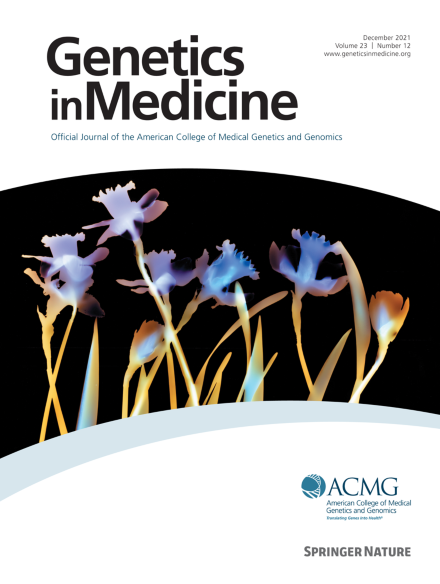Biallelic variants in GTF3C3 result in an autosomal recessive disorder with intellectual disability
IF 6.6
1区 医学
Q1 GENETICS & HEREDITY
引用次数: 0
Abstract
Purpose
This study details a novel syndromic form of autosomal recessive intellectual disability resulting from recessive variants in GTF3C3, encoding a key component of the DNA-binding transcription factor IIIC, which has a conserved role in RNA polymerase III-mediated transcription.
Methods
Exome sequencing, minigene analysis, molecular modeling, RNA polymerase III reporter gene assays, and Drosophila knockdown models were utilized to characterize GTF3C3 variants.
Results
Twelve affected individuals from 7 unrelated families were identified with homozygous or compound heterozygous missense variants in GTF3C3 including c.503C>T p.(Ala168Val), c.1268T>C p.(Leu423Pro), c.1436A>G p.(Tyr479Cys), c.2419C>T p.(Arg807Cys), and c.2420G>A p.(Arg807His). The cohort presented with intellectual disability, variable nonfamilial facial features, motor impairments, seizures, and cerebellar/corpus callosum malformations. Consistent with disruptions in intra- and intermolecular interactions observed in molecular modeling, RNA polymerase III reporter assays confirmed that the majority of missense variants resulted in a loss of function. Minigene analysis of the recurrent c.503C>T p.(Ala168Val) variant confirmed the introduction of a cryptic donor site into exon 4, resulting in mRNA missplicing. Consistent with the clinical features of this cohort, neuronal loss of Gtf3c3 in Drosophila induced seizure-like behavior, motor impairment, and learning deficits.
Conclusion
These findings confirm that GTF3C3 variants result in an autosomal recessive form of syndromic intellectual disability.
GTF3C3双等位基因变异可导致常染色体隐性遗传病伴智力残疾。
目的:本研究详细介绍了一种由GTF3C3隐性变异引起的常染色体隐性遗传智力残疾的新综合征形式,GTF3C3编码dna结合转录因子IIIC的关键组分,该因子在RNA聚合酶iii介导的转录中具有保守作用。方法:采用外显子组测序、微基因分析、分子建模、RNA聚合酶III报告基因检测和果蝇敲低模型对GTF3C3变异进行表征。结果:来自7个无亲缘关系家族的12例患者均检出GTF3C3纯合或复合杂合错义变异,包括C . 503c >T p.(Ala168Val)、C . 1268t >C p.(Leu423Pro)、C . 1436a >G p.(Tyr479Cys)、C . 2419c >T p.(Arg807Cys)和C . 2420g >A p.(Arg807His)。该队列表现为智力残疾、可变的非家族性面部特征、运动障碍、癫痫发作和小脑/胼胝体畸形。与分子模型中观察到的分子内和分子间相互作用的破坏一致,RNA聚合酶III报告基因分析证实,大多数错义变异导致功能丧失。对反复出现的c.503C>T . p.(Ala168Val)变异进行的迷你基因分析证实,在外显子4中引入了一个神秘的供体位点,导致mRNA剪接错误。与该队列的临床特征一致,果蝇中Gtf3c3的神经元缺失会导致癫痫样行为、运动障碍和学习缺陷。结论:这些发现证实GTF3C3变异可导致综合征型智力残疾的常染色体隐性形式。
本文章由计算机程序翻译,如有差异,请以英文原文为准。
求助全文
约1分钟内获得全文
求助全文
来源期刊

Genetics in Medicine
医学-遗传学
CiteScore
15.20
自引率
6.80%
发文量
857
审稿时长
1.3 weeks
期刊介绍:
Genetics in Medicine (GIM) is the official journal of the American College of Medical Genetics and Genomics. The journal''s mission is to enhance the knowledge, understanding, and practice of medical genetics and genomics through publications in clinical and laboratory genetics and genomics, including ethical, legal, and social issues as well as public health.
GIM encourages research that combats racism, includes diverse populations and is written by authors from diverse and underrepresented backgrounds.
 求助内容:
求助内容: 应助结果提醒方式:
应助结果提醒方式:


